Between the Sand and Stars
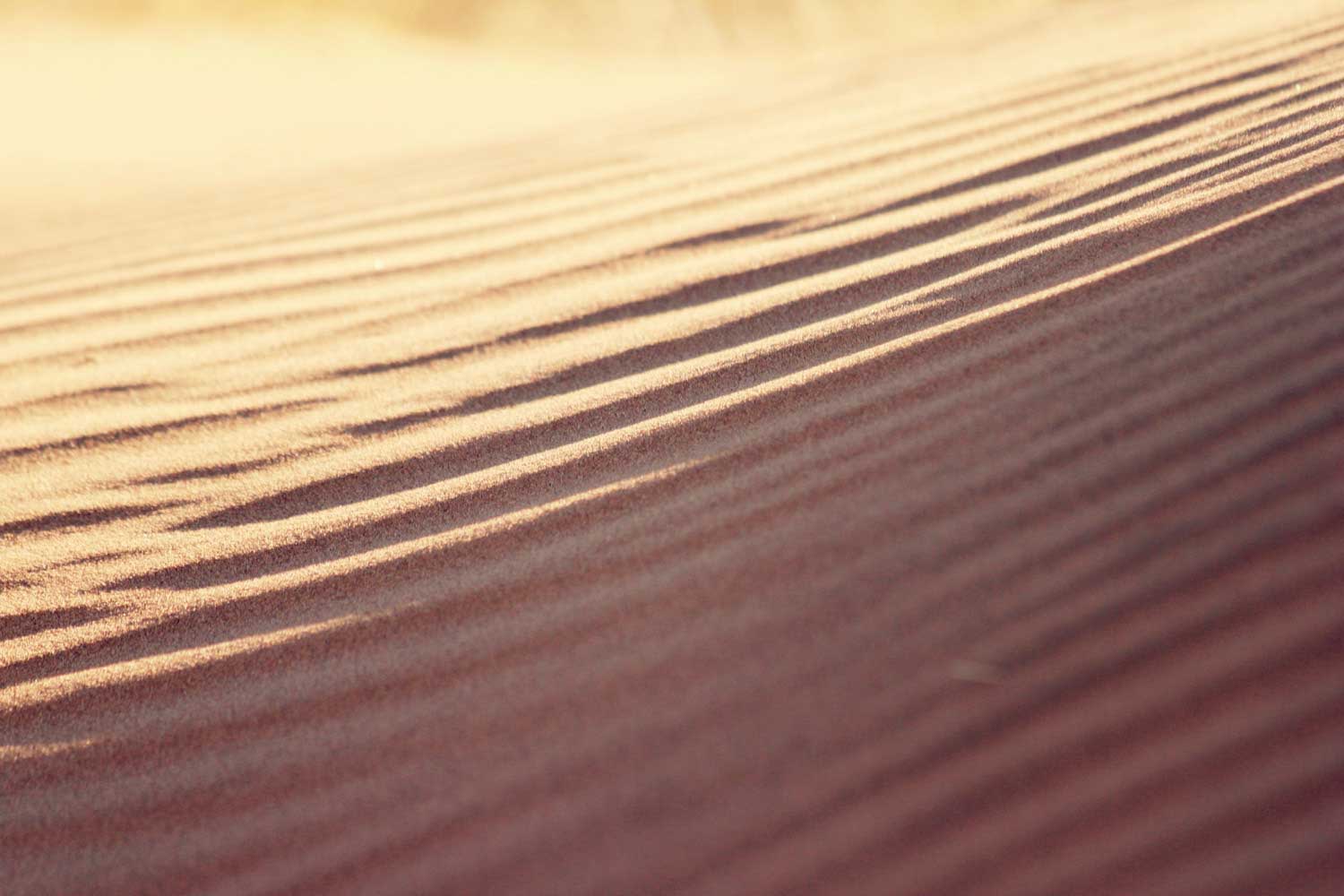
Between The Sand And Stars
By Julie Edwards
No road, no path,
No land marks
Show the way there.
You must go by the stars.
~ Thomas Merton
I took my form under the sign of the sea. The two fish, perpetually locked, tongue to tail in some renderings, swim through the sky in opposite directions. But there are other stars that pull me towards the poles. The stars that point towards home for seekers and sailors remind me instead that I am only content when wandering somewhere in between.
Ursa minor, Polaris fixed as the heavens spin around it. This is something I know. The pattern inspires a sense of, if not exactly quiet, familiarity at least. Faint though it is, a glimpse causes something in me to settle a bit. Crux, on the other hand, fills me with roiling passion. I am overly fond of it, perhaps a bit possessed. After first laying eyes on it I searched the sky relentlessly each subsequent evening. I tried to photograph it, memorize it, speak to it. On a train in southern Africa I rode through hours of the night with my head hanging out the window, gaze locked on it, neck bent at increasingly odd angles so as not to lose it for even a second. I hated to blink. When the track turned I felt like a child – convinced that when it was out of my sight it had disappeared forever, that I might never see it again. When it reappeared I was flooded with relief. On the train that night I cried and cried into the darkness, weeping like a young girl about to be torn from the arms of her beloved. It was less romance than madness.
I go by the stars, but they lead me nowhere.
I could fall asleep floating on water. At the shore, I suck saltwater from the ends of my hair and refuse to brush the sand off my feet before going to bed. People who know this find it odd that I am drawn to the desert. I try to explain, while secretly rejoicing that they know me so little. Like the desert, I have managed to keep some careful mysteries. But mine is no mystery, really. Deserts echo the great primeval seas, and I have always preferred the idea of something to the thing itself.
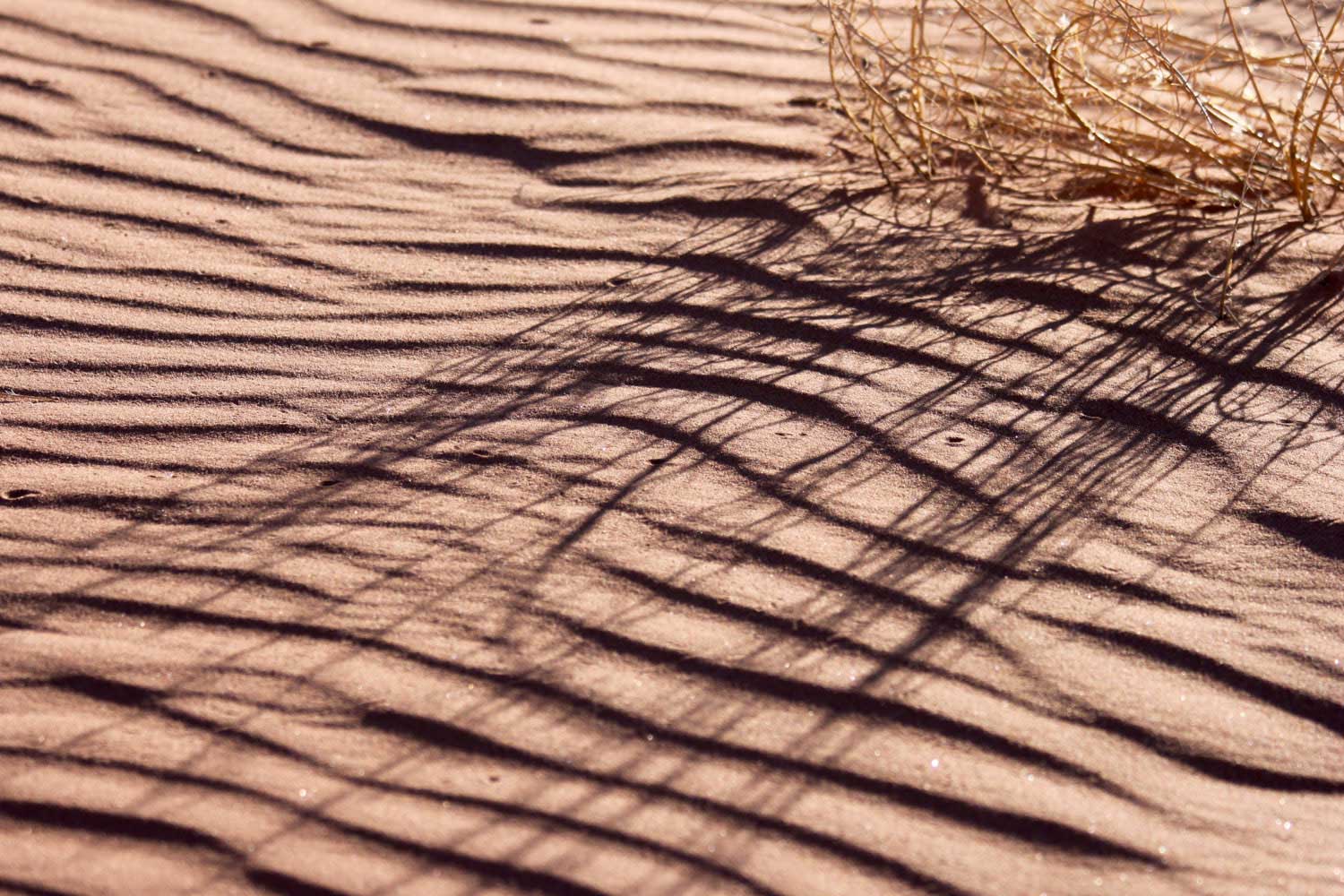
In Utah, I have a recurring fantasy. In it, I give up everything for the desert. I let my skin go brown and leathery, crossed by deep lines that mimic the dry arroyos. My hair grows long and wild. I sleep when the sun sets, wake when it rises, rest in the shade with the lizards. The world and I undergo a mutual forgetting. I live without lights, without language. The seeds of this fantasy were planted in another desert, years ago and a world away in the Holy Land, in a monastery cut into the rock above the sand. It it was impossibly situated, clinging to a cliff, the yellow stone of the cells and the hallway between them, which opened to the sky, reverberating with the silence peculiar to deserts. I didn’t linger, but it was there that I realized I had a backup plan. Should the bottom ever fall out of my life, I would retreat to the desert. It seemed the most logical thing in the world.
At dinner one evening a friend said, “I understand. You go to the desert because that’s where you heal.”
I must have smiled vaguely at this, wondering what the hell he was talking about. His assessment was so far from the truth as I understood it that it was laughable. My increasingly frequent trips to the deserts of the American Southwest and my propensity to seek out desert places while traveling have nothing to do with healing. I go to the desert because it hurts.
Once, in Capitol Reef, I hiked for miles with my eyes glued shut, seared by sand and salt and sun. It was the middle of the day, hot at the bottom of the canyon, the entire world baked white. I couldn’t see a thing. The pain of opening my eyes was profoundly intimate. It hurt beyond belief. I borrowed a pair of yellow-tinted sunglasses that helped with the glare, but for a long time the pain and the heat were the only things that existed. We had lost the trail and were hiking in deep sand, which alternated in color from ochre to pure white depending on the type of sandstone disintegrating in the wind. My boots filled with the stuff. I refused to dump them out, recognizing the futility of it and terrified that my swollen feet wouldn’t fit back into them. I couldn’t stand the feeling of anything against my body and my shoulders burned. I rubbed sand and salt and skin away in layers. That night I writhed on the floor of the tent, sick from the heat and dehydration.
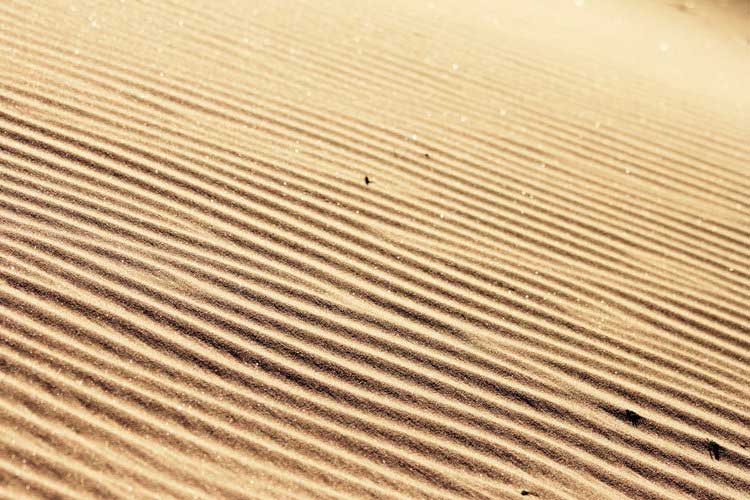
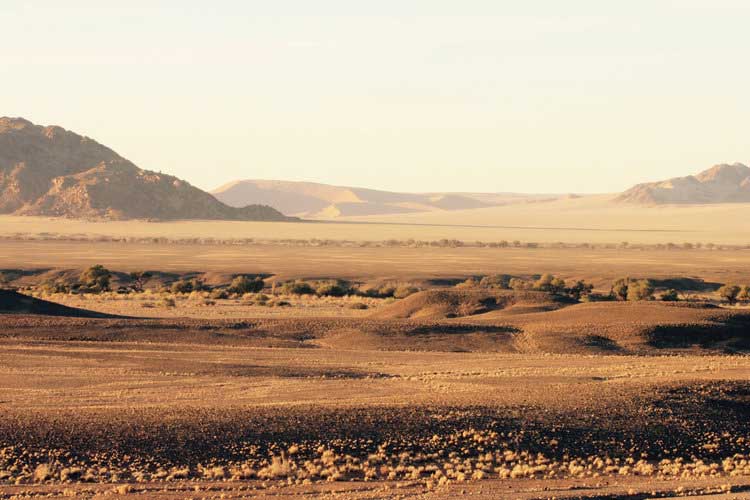
Now I hike in the mornings and evenings. In the middle of the day I seek out a grotto, climb inside and stay still. I keep time with the lizards. The hollows in the sandstone remind me of altars, and I’ll offer myself up on one while my companions go out to explore. There is no sound here. The scrub is so low that it doesn’t catch the wind. The cottonwoods are so far apart that the wind doesn’t seem to catch them, either. The wind, when it rises, is the only sound, replaced when it dies down with the wingbeats of a low-flying raven. Even those are far between, as if she, like me, can’t be bothered to move in the midday heat.
It is easy to see things that aren’t there, miss things that are. Even the ants leave trails in the sand. I sit in the shade and watch a solitary fellow, black head and abdomen bracketing a bright red thorax, carefully cross the sand in search of I can’t imagine what. Behind me, a small lizard creeps out and quick-as-lightning captures her lunch. The desert sweeps itself clean, but in between scourings I try to read the hieroglyphics of the animals. Lizards, snakes, insects. Deer or desert sheep, sometimes. Coyote. In southern Africa, gemsbok, springbok, beetle, giraffe. My own ungainly tread.
My sense of water is heightened here. I can smell the impossibility of it. The desert, that conjurer, makes water seep from the sand and dresses pads of prickly pear with startling fuchsia crowns that open and close with the sun. Like all magic, water here cannot be trusted. Whatever stream fed this cottonwood is long since gone, or perhaps just gone underground. One half of the tree is dead, the other alive with leaves that appear, depending on how the light hits them, lime or grass green – colors that don’t belong here. Close to the ground the trunk is gnarled and peeling, so ancient it looks like it predates the rocks. The bark sheds in huge pieces that feather out in a series of small, fine cracks, making each plank look like a filet of fish delicately flaking apart.
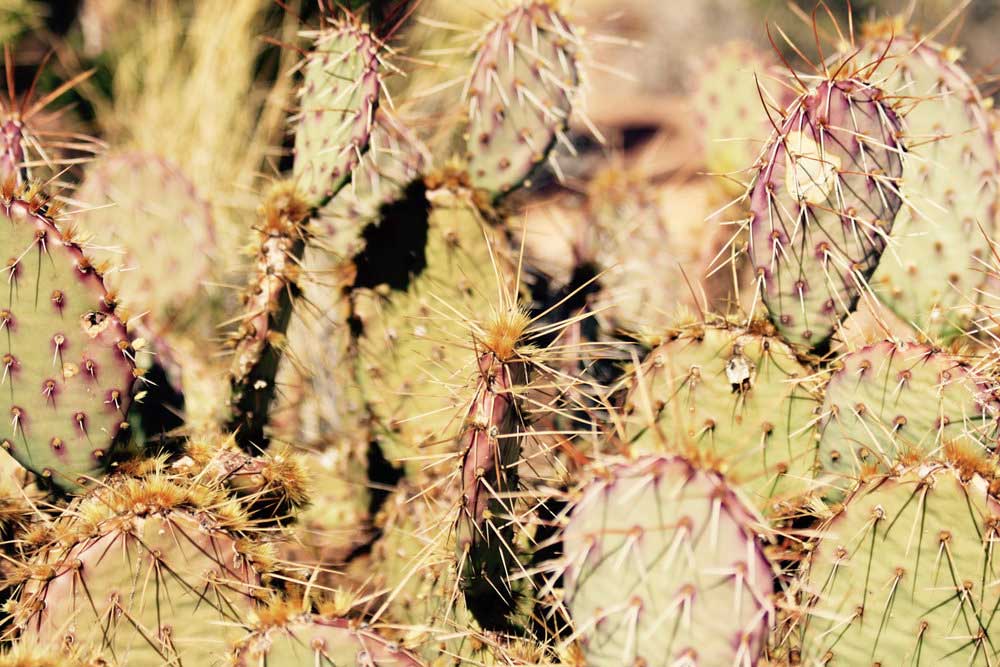
I love the desert because it is continuously destroying and recreating itself, obliterating me in the process.
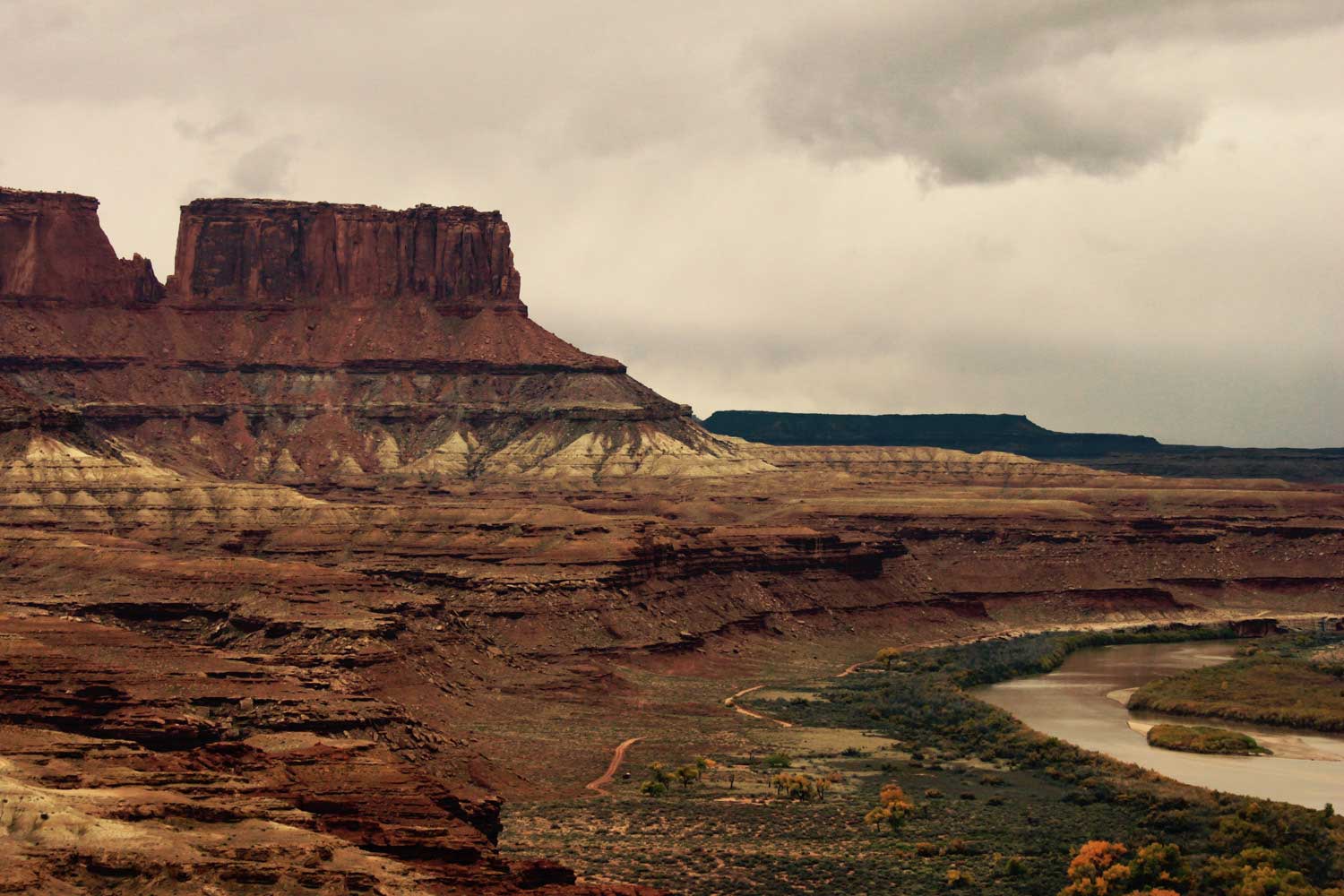
I love the desert because it is continuously destroying and recreating itself, obliterating me in the process. Plagued by an ever-spinning mind, the heat and sun conspire to bake every thought out of my head. It is blessed relief. I lose my self, become only the sum of my parts, find that not only do I not care, I am in fact grateful. I move through the silent days. At night I sleep deeply, dreaming of strange things.
When I can think, I reflect on the desert, my mind shimmering just above the surface like heat haze. The desert is magician, playing tricks with light and distance and dimension. It is priestess, anointed with the sweet astringency of sage and olive. It is Shiva, landscape of duality – rock and water, death and beauty. It busies itself with making and unmaking. The river drops, the cliffs rise. The wind rises, the cliffs give themselves over to sand. The sand shifts, ceaseless.

All of this is a lie, of course. The desert is none of these things. It is the most nowhere of places – absolutely, utterly indifferent. It certainly pays me no mind.
This is where the stars lead me. Night falls completely, and cold, in the desert. In Utah I stretch myself out on the sandstone and watch Ursa minor spin. In southern Africa I weep for Crux, that diamond threaded through with the Milky Way. I search for satellites. Look for signs. Close my eyes and feel the pull of the poles.
Julie Edwards is a writer & photographer based in Missoula, Montana. Find more of her work on her Website and read about her overlanding adventures on her blog.
Be the first to comment